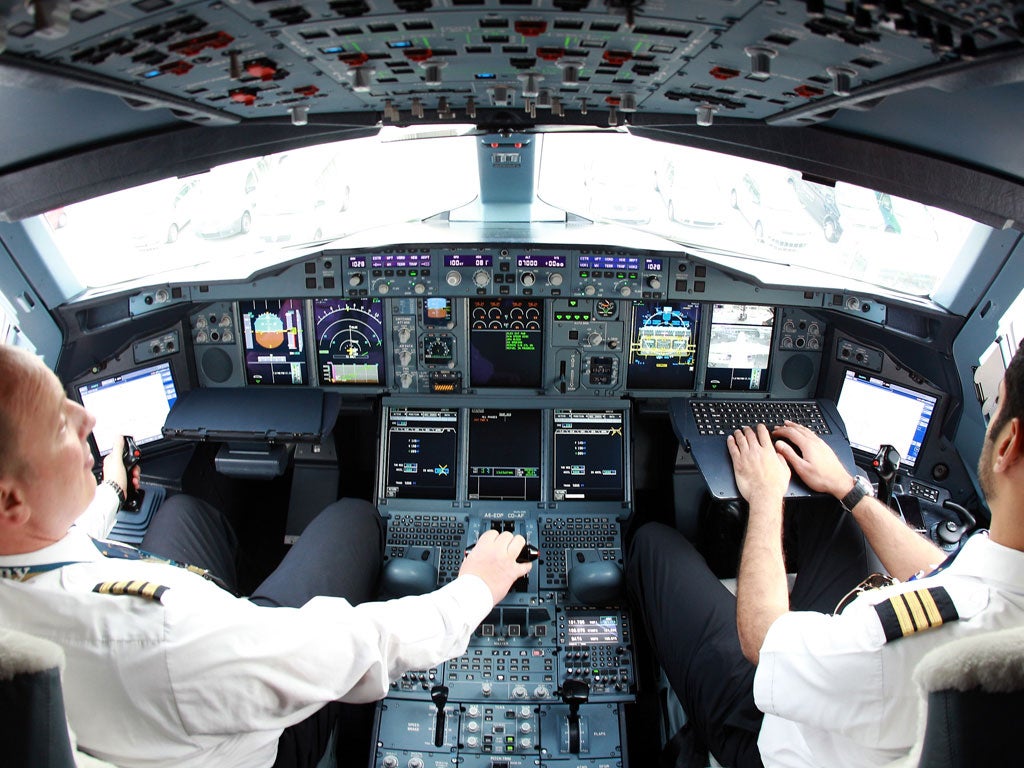Pilots admit they 'nod off' – and their hours are set to soar

The lives of air passengers could be put at risk by tired pilots falling asleep or making an error as a result of new European rules increasing their working hours, MPs were warned yesterday.
The pilots' union, Balpa, said that even under the present system, which limits the amount of time they can spend in the air after waking, nearly half of its members admitted nodding off in the cockpit.
Giving evidence to the Transport Select Committee, the union's head of safety, Dr Rob Hunter, said the real figure was likely to be much higher because of under-reporting by pilots who were often unaware they'd been asleep.
Balpa is opposing the harmonisation of rules between Britain and the rest of Europe which it said could lead to some pilots working for up to 22 hours at a stretch. Current safety laws limit this period to 16 and a half hours.
The union said human error caused up to 80 per cent of crashes and that the the new standards from the European Aviation Safety Agency meant pilots would be "more tired more often", and thus more likely to make a mistake.
"Compared to the UK's domestic rules, the EU proposals would see pilots [flying] further – as far as California – with no back-up crew and, contrary to scientific advice, allow pilots to do up to seven early starts in a row, which is desperately fatiguing," said Balpa's general secretary, Jim McAuslan.
In a survey of 500 pilots Balpa found that 43 per cent had involuntarily fallen asleep while flying. Of these a third said they had woken to find their co-pilot slumbering as well. Even under the present system the union estimated that pilots could be landing when they had a one in five chance of falling asleep – meaning their reactions would be those of a pilot with a blood-alcohol level four times the current legal limit for flying. Balpa said the new rules would make the situation "much worse".
A crash involving a Colgan Air flight in New York three years ago, in which 50 people died, led to a change in US rules to minimise pilot fatigue.
After a sudden loss of cabin pressure pilots have 15 seconds to put on their oxygen masks before they lose consciousness. Even when flying on autopilot they must make routine checks and monitor radio transmissions.
Balpa is backed by the union Unite, which represents cabin crew, and the European Cockpit Association (ECA). Kris Major, of Unite, said the proposals would increase pilots' workloads by 17 per cent; and Jon Horne, of the ECA, said there was a five-and-a-half times higher chance of an accident when duty periods exceeded 13 hours.
The industry's costs are soaring, but Captain Tim Price, of British Airways, said airlines were not putting profits before safety. The UK's Civil Aviation Authority said there was no evidence that the European proposals would put passengers at risk. Its chief executive, Andrew Haines, said it would be "exceptionally rare" for pilots to be asked to fly after being awake for 22 hours.
The move was also backed by the aviation minister, Theresa Villiers, who said UK passengers would be safer once the rules were harmonised.
Flying on empty: A pilot's timetable
Current
0700 Pilot awakes
0800 Arrives at airport to begin shift – take-off and landing; post-flight checks
2400 Finishes shift; starts rest period including 10 hours of hotel availability
1000 Begin new shift
Proposed
0700 Pilot awakes
0800 Arrives at airport and begins four hours on standby
1200 Flight begins
0400 Discretionary rest period starts
0600 Shift ends – eight-hour sleep period
1400 Begins new shift
BAA broke 'snow plan' pledge
More than a year after Heathrow was crippled for five days by heavy snowfalls, airports operator BAA admitted yesterday that it had spent less than two-thirds of the £50m they planned to invest in cold-weather precautions.
The world's busiest airport has so far spent £20m on 68 new snowploughs, taking the total to 185, and £12.4m on training staff, including a team of "snow experts".
Last month, snow saw 41 per cent of Heathrow flights cancelled.
The spending shortfall comes despite the owner BAA's full-year, underlying profits for 2011 rising by 17 per cent to £1.13bn.
Join our commenting forum
Join thought-provoking conversations, follow other Independent readers and see their replies
Comments